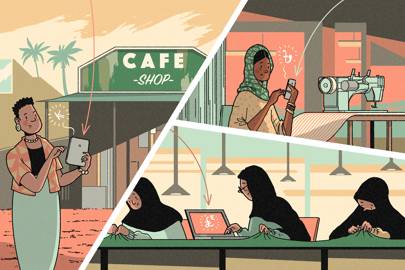
R. Fresson
In the fight against Covid-19, women have been on the front lines of the outbreak – making up a majority of the healthcare workers and bearing much of the responsibility for caregiving with children out of school and relatives falling ill. They have also been disproportionately impacted by the economic consequences of the pandemic – a disadvantage that’s exacerbated by the challenges women face when it comes to accessing financial services: globally, only a third of women have bank accounts and less than a quarter of loans are made to female business owners.
“Inequality and exclusion are two of the biggest barriers to women’s prosperity and this isn’t just a developed or developing world problem alone,” says Shamina Singh, founder and president at the Mastercard Center for Inclusive Growth. “One and a half billion people are excluded from the global economy. And things like basic forms of identification that are needed in the formal economy are still out of reach for many women.”
Digital financial projects around the world are helping to bridge that gender gap by offering women more control over their earnings by digitizing their wages, empowering them to manage their money with apps and mobile wallets, and helping grow their businesses with loans using alternative credit scoring. “Because women traditionally manage resources for their families, providing them with safe and secure ways of saving and spending the money they earn can accelerate financial inclusion opportunities for them, their families and their communities,” says Singh.
One way Mastercard has been targeting its support of women is through a partnership with BSR and HERfinance to educate garment workers in Bangladesh, Egypt and Cambodia as they transition from cash to digital wages. Those efforts didn’t begin with Covid but became even more important during lockdown when factory closures and social distancing requirements made it difficult to collect pay in person. “If you’re trapped in a cash-only economy, the only way you can engage in commerce is face to face,” Singh adds. ” In today’s world, that probably isn’t the safest way.”
Digital wages enable garment workers, many of whom are women, to safely collect their pay and build up savings. Following the introduction of the HERfinance program in Egypt, there was a ten per cent increase in women reporting they made spending decisions jointly with their family, explains Singh, and an 11 per cent increase in men agreeing that women should have equal access to financial services.
Education and improving financial know-how are vital to this effort. For example, in India, three years after the country digitized wages, people were still withdrawing all their salary as cash on payday. To avoid this happening, the HERfinance Digital Wages programmes trained workers on using financial solutions effectively to save, make purchases and remit payments. “Without the training, education and the understanding around usage of those tools, it’s really difficult to create a shift in long-term financial behavior,” says Singh. Going digital also helps provide a safer, more secure way to save and plan, thereby giving low-income workers – especially women – the tools to improve their lives.
Building programmes that genuinely succeed and make a difference to women excluded from financial systems around the globe requires partnerships and local knowledge. In Kenya, Mastercard worked together with Unilever and KCB Bank to develop a small business finance solution called Jaza Duka, which means “fill up your store”. Dukas are small shops famous in the country, whose owners struggle to get the money they need to grow – 70 per cent of female-run small businesses in the developing world don’t have access to funding, pushing entrepreneurs to borrow from informal lenders, which can spark a cycle of debt.
Jaza Duka offers micro-credit which is calculated based on previous sales of Unilever products, paid out digitally and repaid via mobile phones to let shop owners buy more inventory to steadily grow their business. So far, 20,000 stores have taken part, including one run by Lucy Njoki Njoroge on the outskirts of Nairobi.
Thanks to Jaza Duka, she can buy products on credit and pay back after the stock has sold, with the amount she can borrow growing as she proves her creditworthiness. “Jaza Duka has helped me a lot. I have money for my house and my children’s school fees,” she says. “I hope to expand my shop so it can be bigger than it is now.” And that will let her do more for her family. “I want my children to have a good education; I want them to follow their dreams.”
Other programmes are designed to overcome social and cultural norms that present barriers to women’s financial inclusion. Singh details just a few of those the centre is involved in: in Indonesia, a programme and partnership with Women’s World Banking was designed to address social norms that may discourage women from providing their mobile number to a male banking agent. Midwives are being trained to become digital agents to help deliver banking services to more remote regions through a trusted member in the community.
Such work is set to continue, as Mastercard doubled down on its commitment to include one billion people and 50 million small businesses in the digital economy by 2025, with a focus on helping 25 million women entrepreneurs reach their potential. “Mastercard has been on a multi-year journey to make the digital economy work for everyone. That takes on new meaning and importance this year, when rebuilding a more inclusive and sustainable economy will require access to digital tools,” Singh concludes.
—
For more information, visit mastercardcenter.org
Source : From the Web